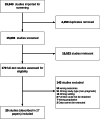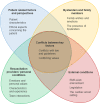Non-medical factors in prehospital resuscitation decision-making: a mixed-methods systematic review
- PMID: 35346307
- PMCID: PMC8962561
- DOI: 10.1186/s13049-022-01004-6
Non-medical factors in prehospital resuscitation decision-making: a mixed-methods systematic review
Abstract
Aim: This systematic review explored how non-medical factors influence the prehospital resuscitation providers' decisions whether or not to resuscitate adult patients with cardiac arrest.
Methods: We conducted a mixed-methods systematic review with a narrative synthesis and searched for original quantitative, qualitative, and mixed-methods studies on non-medical factors influencing resuscitation of out-of-hospital cardiac arrest. Mixed-method reviews combine qualitative, quantitative, and mixed-method studies to answer complex multidisciplinary questions. Our inclusion criteria were peer-reviewed empirical-based studies concerning decision-making in prehospital resuscitation of adults > 18 years combined with non-medical factors. We excluded commentaries, case reports, editorials, and systematic reviews. After screening and full-text review, we undertook a sequential exploratory synthesis of the included studies, where qualitative data were synthesised first followed by a synthesis of the quantitative findings.
Results: We screened 15,693 studies, reviewed 163 full-text studies, and included 27 papers (12 qualitative, two mixed-method, and 13 quantitative papers). We identified five main themes and 13 subthemes related to decision-making in prehospital resuscitation. Especially the patient's characteristics and the ethical aspects were included in decisions concerning resuscitation. The wishes and emotions of bystanders further influenced the decision-making. The prehospital resuscitation providers' characteristics, experiences, emotions, values, and team interactions affected decision-making, as did external factors such as the emergency medical service system and the work environment, the legislation, and the cardiac arrest setting. Lastly, prehospital resuscitation providers' had to navigate conflicts between jurisdiction and guidelines, and conflicting values and interests.
Conclusions: Our findings underline the complexity in prehospital resuscitation decision-making and highlight the need for further research on non-medical factors in out-of-hospital cardiac arrest.
Keywords: Decision-making; Ethics; Out-of-hospital cardiac arrest.
© 2022. The Author(s).
Conflict of interest statement
The authors declare that they have no competing interests.
Figures
References
-
- Myat A, Song K-J, Rea T. Out-of-hospital cardiac arrest: current concepts. Lancet. 2018;391(10124):970–979. - PubMed
-
- Anderson NE, Gott M, Slark J. Commence, continue, withhold or terminate? A systematic review of decision-making in out-of-hospital cardiac arrest. Eur J Emerg Med. 2017;24(2):80–86. - PubMed
-
- Mentzelopoulos SD, Couper K, Voorde PV, Druwé P, Blom M, Perkins GD, et al. European Resuscitation Council Guidelines 2021: ethics of resuscitation and end of life decisions. Resuscitation. 2021;161:408–432. - PubMed
-
- Sasson C, Forman J, Krass D, Macy M, Kellermann AL, McNally BF. A qualitative study to identify barriers to local implementation of prehospital termination of resuscitation protocols. Circ Cardiovasc Qual Outcomes. 2009;2(4):361–368. - PubMed
-
- Leemeyer AR, Van Lieshout EMM, Bouwens M, Breeman W, Verhofstad MHJ, Van Vledder MG. Decision making in prehospital traumatic cardiac arrest; a qualitative study. Injury. 2020;51(5):1196–1202. - PubMed
Publication types
MeSH terms
LinkOut - more resources
Full Text Sources
Medical



